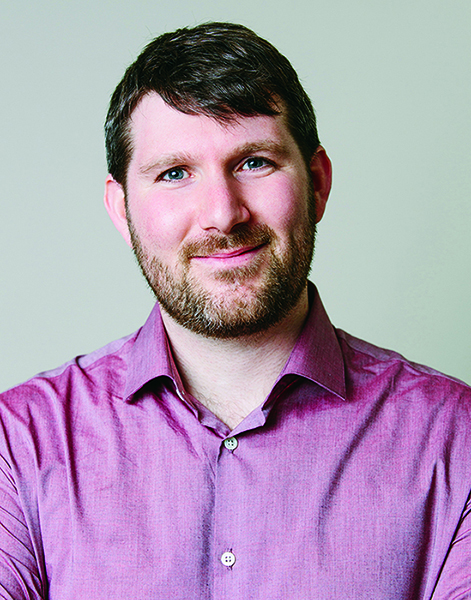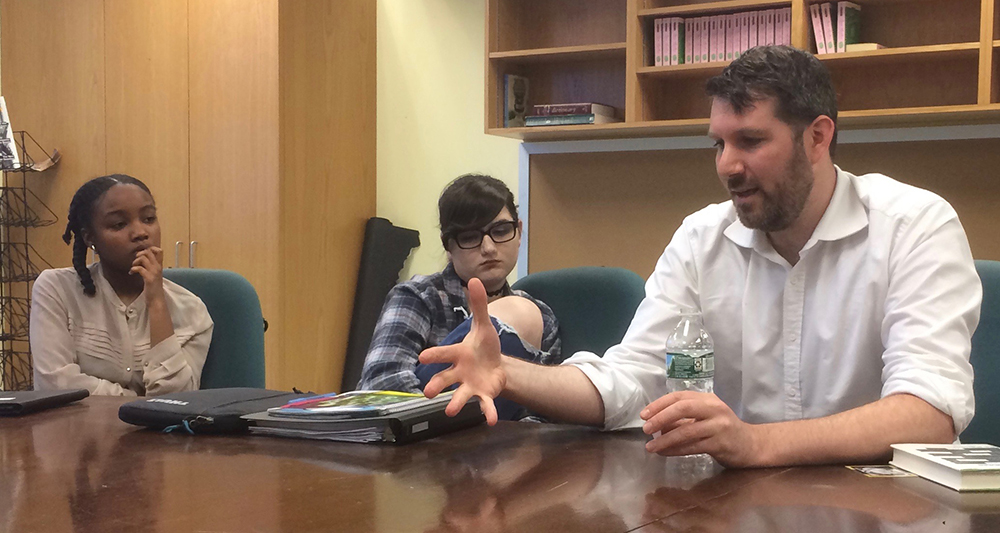Eli Pariser ’96 Exposes Hidden Side of Internet to Bard Early College Students
“If journalists share information that is retrieved from within their own filter bubbles, are they basically spreading one specific point of view? If so, how does this skew the information that we receive?”
That’s what student Pooja Patel asked Eli Pariser, Upworthy president/co-founder, author, and Bard College at Simon’s Rock alumnus, during his recent visit to Robert Greenberg’s Internet and Society class at Bard High School Early College Queens.

Eli Pariser, center, with students at Bard High School Early College Queens.
Pooja found it interesting that in his response, “Eli told us that a journalist’s points of view are also affected by where they live, their environment. Before, I was only thinking about the relationship between journalism and filter bubbles, but he gave us a wider outlook on what else impacts a journalist’s view points. He gave me more to think about.”
Robert has been teaching Internet and Society since spring 2011. That same spring, Eli published The Filter Bubble: What the Internet is Hiding From You. The following year, Robert wrote a lesson based on ideas in Eli’s book, as well as in the book Republic.com by Cass Sunstein, which asks students to reflect on the political and social consequences of self-selecting information from the internet (and television). “I think it’s fair to say that the ideas in both their books have enjoyed a renaissance in the era of Brexit and Trump.”
Robert selects guest authors based on the same criterion for selecting course texts, which is dialogue related to the course’s guiding question: “How is the internet changing the way we live?” Robert has been corresponding with Eli via email for several years about joining as a guest author, and their schedules aligned this semester.
 Eli is one of 25 guest authors Robert has invited in person or via videoconference.
“The guest author series has been popular with the students, as it helps them engage
with course themes and also provides an opportunity for direct and interactive exchange
with a public intellectual.”
Eli is one of 25 guest authors Robert has invited in person or via videoconference.
“The guest author series has been popular with the students, as it helps them engage
with course themes and also provides an opportunity for direct and interactive exchange
with a public intellectual.”
Eli graduated from Simon’s Rock with a bachelor of arts in Politics, Law, and Society in 2000. That fall, at the age of 19, he and a group of friends started The American Story Project, a Web documentary in which they interviewed Americans about the way they perceive politics. That project was set aside, when a year later, Eli created the website, 911-peace.org, in response to the Sept. 11, 2001 attacks.
Eli’s website merged with MoveOn.org, a progressive public policy advocacy group, which he joined that November. He served as executive director from 2004 to 2009, and still serves as board president. He also co-founded Avaaz.org, which is now the largest online advocacy organization in the world. In 2012, Eli co-founded Upworthy, a media company “on a mission to tell stories that bring people together—because we’re all part of the same story.”
In the fall 2014 Simon’s Rock magazine, Eli expressed that at both MoveOn.org and Upworthy, “my focus has been on how to leverage this amazing new set of tools and these amazing new ways of communicating through the internet to make society and democracy hopefully a little bit better.”
Each semester, Robert’s students consider the internet’s profound impact on contemporary society, and its wide range of effects—from impacts on privacy and intellectual property to technology’s evolving effect on socialization and the changing neurocircuitry of the brain.
In preparation for Eli’s visit, Robert assigned the students selected online articles—most of them focused on Eli or the companies he is associated with—and in response, create a story that included a gist statement, a guiding question, and a critical response. The students published their assignment on Medium, an online publishing platform that allows the user to read, write, and interact with stories that matter most to them.

Eli answers student-driven questions.
Klaudia Bak questioned Eli about “fake news,” wondering how the average internet user can tell the difference between reliable and unreliable websites. In response, Eli shared data from a study in which different groups of people with different professional backgrounds were asked to determine whether or not a site was legitimate. Klaudia found the study to be interesting, and helpful in learning how to navigate the internet better.
Hannah Oscar observed that “Eli didn’t have any notes with him when he answered our questions. This made the conversation relaxed, enjoyable, and comfortable. The class really appreciated his visit.”
“The experience was a great opportunity to tap into Eli's mind.”
-Awildo Gutierrez,
Student, Bard High School Early College Queens
Robert was pleased with the experience. “It was fun to see my students interact with Eli. They worked hard preparing for his visit, and did a terrific job representing themselves and our school.”
Guest authors in Robert’s class over the years have included: George Brock, Out of Print: Newspapers, Journalism and the Business of News in the Digital Age; David Burstein, Fast Future: How the Millennial Generation is Shaping Our World; Virginia Heffernan, Magic and Loss: The Internet As Art; John Palfrey, Born Digital; Christine Rosen, senior editor of The New Atlantis; and Clive Thompson, Wired contributor, among others.